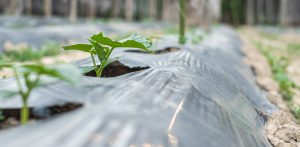
Ontario firms Aduro, Switch Energy partner to recycle agricultural plastics
Canadian Plastics
Canadian Plastics Recycling Research & Development SustainabilityThe companies are in discussions about building a pilot plant in Sarnia to recover polyethylene and polypropylene used in agriculture.

Photo Credit: Adobe Stock/phoderstock
Ontario firms Aduro Clean Technologies and recycler Switch Energy have started talking about a potential partnership to design, build, install, and operate a pilot plant in Sarnia to process waste polyethylene and other types of plastic waste – such as polypropylene (PE) – that are used in agriculture.
Sarnia-based Aduro has developed patented water-based technologies to chemically recycle plastics and turn heavy, renewable crudes into new-age resources and higher-value fuels; and Clinton-based Switch Energy is the owner and operator of Ontario’s largest collection program for agricultural waste.
The problem the two firms are trying to solve is this: Although Canadian farms generate an estimated 60,000 tonnes of plastic every year, until now, there hasn’t been a way to locally process this waste plastic in a cost-effective and environmentally friendly manner. “This is mainly because most plastic recycling technologies and projects require large-scale installations to achieve economic feasibility, putting them out of reach for many recyclers,” Aduro officials said. “[We] would instead deploy modular, smaller-scale facilities that can be co-located at or near waste streams.”
The companies envision a pilot plant that will accommodate the need for farmers to economically divert their agricultural waste plastics from landfills. Aduro officials say they’ll provide expertise in the Hydrochemolytic technology (HCT) process design, including identifying optimal finished product specifications and engagement with the chemical and petrochemicals industry for long-term offtake engagement. HCT is a chemical deconstruction process that rapidly converts various kinds of plastic into components useful for a variety of consumer applications, for fuel, and even for true chemical recycling that produces new, virgin plastics.
“Achieving the [pilot] remains a main goal for us, which means demonstrating that our technology works well in the continuous-flow mode needed for commercial systems,” said Aduro CEO Ofer Vicus. “Our data supports new discussion regarding pilots for different applications, such as waste plastics.”
Aduro’s HTC technology operates at low temperatures, has no issue dealing with high concentration levels of moisture, and is versatile enough to process other types of plastics and contaminates, Vicus added.
“Our discussions with Aduro over the past few months, along with an in-depth review of their technology, has convinced us that their HCT-based solution is a superior solution compared to alternatives,” said Switch Energy founder and CEO Don Nott.
Both Nott and Vicus agree that the possibility of a similar project across the provinces of Canada, and all of North America, can eliminate the cost of landfill disposal by increasing the value of waste plastic. Aduro anticipates the proposed project will further demonstrate the economic feasibility of small-scale plastics processing using its HCT.
Founded in 2011, Aduro is a developer of patented water-based molecular recycling technologies that transform waste plastics, heavy crude, and renewable oils into new-era resources and higher value fuels. Originally developed to upgrade heavy oil, Aduro has redirected and reconfigured HCT to upcycle plastics and upgrade renewable oils.
